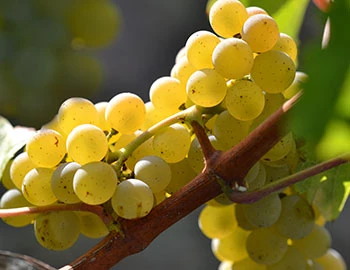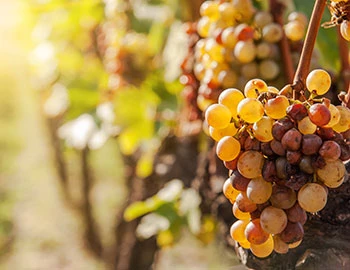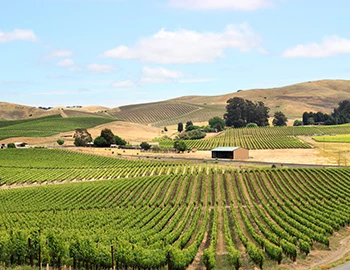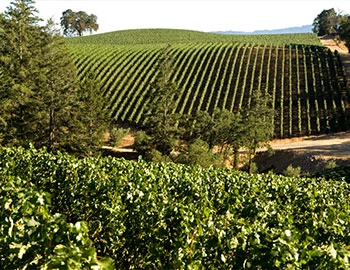
Sauvignon Blanc North Coast 2021
North Coast, Duckhorn Vineyards, 750 ml

| Grape variety: | Sauvignon Blanc, Sémillon |
| Producer: | Duckhorn Vineyards |
| Origin: | USA / California / North Coast |
Description
The grapes for this mainly Sauvignon Blanc wine come from the best vineyards on the North Coast of California. The Sauvignon Blanc North Coast is rich yet elegant, with a small amount of Sémillon adding depth, complexity and smoothness. On the nose, it reveals enticing aromas of lemon verbena, pineapple, lime and honeydew melon. On the palate, it is silky and mouth-filling, due in part to several months of ageing on the lees. A refreshing acidity frames the tantalising citrus and tropical fruit flavours leading to a long and concentrated finish.
Wine competence since 1844!

Selecting wines and spirits has been our great passion for more than 180 years. Every day, we do everything we can to find you the perfect drop for every dish, every occasion and every taste!
Attributes
| Origin: | USA / California / North Coast |
| Grape variety: | Sauvignon Blanc, Sémillon |
| Ripening potential: | 2 to 5 years |
| Drinking temperature: | 10 to 12 °C |
| Food Pairing: | Smoked fish, Goat's cheese, Grilled fish |
| Vinification: | fermentation in steel tank, fermentation in wooden barrel |
| Harvest: | strict selection, hand-picking |
| Maturation: | on the yeast |
| Bottling: | filtration |
| Maturation duration: | 5 months |
| Volume: | 14.0 % |
| Note: | Contains sulphites |
Duckhorn Vineyards
Co-founded by Dan and Margaret Duckhorn in 1976, Duckhorn Vineyards has spent nearly fifty years establishing itself as one of North America’s premier producers of Napa Valley wines.
From its modest first vintage of 800 cases of Cabernet Sauvignon and 800 cases of Merlot in 1978, to its addition of Sauvignon Blanc in 1982, Duckhorn Vineyards has cultivated a tradition of quality and excellence that continues today, making Duckhorn Vineyards one of the most renowned producers of Bordeaux varietal wines.
Fundamental to this tradition was the early decision to focus on the production of premium Merlot. Although many Napa Valley wineries used Merlot as a blending grape in the late 1970s, only a few spotted its potential as a wine in its own right. Dan Duckhorn, a huge fan of Merlot since his travels to Saint-Émilion and Pomerol, felt that this elegant grape variety was underestimated in North America. In the late 1980s, the Duckhorns began acquiring more vineyards in acclaimed areas of the Napa Valley. Today, the Duckhorn Napa Valley Estate Vineyard portfolio comprises of nine unique vineyards, including St. Helena, Yountville, Calistoga and Howell Mountain. Each of them is growing Merlot alongside other grape varieties such as Cabernet Sauvignon, Cabernet Franc, Petit Verdot, Sauvignon Blanc and also Chardonnay, whose different characteristics reflect the variations in soil, terrain, microclimate and exposition. In 2001, the traditionally styled Estate House was built in beautiful St. Helena with stunning views of the surrounding vineyards.

Sauvignon Blanc
The Sauvignon blanc can be recognized with your eyes closed. Its typical bouquet is marked by green notes: freshly cut grass, tomato bunches, gooseberry. Citrus fruits, cassis and flint join into the mix. In warmer latitudes it also shows exotic aromas, such as passion fruit. Its acidity is decidedly lively. In all likelihood, it comes from the Loire Valley, where it is vinified in Pouilly-Fumé and Sancerre in its purest form: varietally, and without timber. In the 18th century, it found its way to Bordeaux. Ambitious producers assemble it there with Sémillon into substantial whites, which are aged in oak barrels. The Sauvignon blanc has been a sensational success in the past 20 years in New Zealand. With its refreshing sweet-and-sour style, winemakers from down under have conquered the world. The rich Sauvignons from Styria and crisp examples of South Tyrol and Friuli are worth mentioning as well. It pairs with anything from the sea. Or do it like they do on the Loire, and enjoy it with goat cheese.

Sémillon
The fungi be thanked
The Sémillon grape is the basis of the legendary sweet wines of Sauternes. Its origins are there, in the southern part of the Bordeaux region. Its secret to success is its susceptibility to the Botrytis fungus, which pierces the skin of the ripe berries. Thus the water evaporates, and the sugar in the fruits concentrates. The musts are as thick as syrup. They present the citrus-fresh, fruity aromas of the Sémillon varieties. In addition, the Botrytis fungus contributes complex notes of honey, dry apricot and candied orange to the wine. The Sémillon is closely related to the Sauvignon blanc, and almost all sweet wines from Sauternes and its surroundings contain a small proportion of Sauvignon. The dry whites from Bordeaux are the opposite: the Sémillon mostly plays the supporting role. In early-19-century South Africa, Sémillon was the most planted grape. However, only vanishingly small quantities still grow there today. However, the vine has since taken root in California and Australia.

Sauvignon Blanc
The Sauvignon blanc can be recognized with your eyes closed. Its typical bouquet is marked by green notes: freshly cut grass, tomato bunches, gooseberry. Citrus fruits, cassis and flint join into the mix. In warmer latitudes it also shows exotic aromas, such as passion fruit. Its acidity is decidedly lively. In all likelihood, it comes from the Loire Valley, where it is vinified in Pouilly-Fumé and Sancerre in its purest form: varietally, and without timber. In the 18th century, it found its way to Bordeaux. Ambitious producers assemble it there with Sémillon into substantial whites, which are aged in oak barrels. The Sauvignon blanc has been a sensational success in the past 20 years in New Zealand. With its refreshing sweet-and-sour style, winemakers from down under have conquered the world. The rich Sauvignons from Styria and crisp examples of South Tyrol and Friuli are worth mentioning as well. It pairs with anything from the sea. Or do it like they do on the Loire, and enjoy it with goat cheese.

California
California: Lots of fruit and ripe tannins
Around 90 percent of the wine produced in the USA comes from California. The Napa Valley, situated roughly 100 kilometers north of San Francisco, is the most prominent wine region in the western hemisphere. California vintners first caused an international sensation with Chardonnay and Cabernet Sauvignon. Today, however, superior wines are also produced from Pinot Noir, Syrah and other varieties. California’s wine country shows more variety today than ever before.

USA
USA - Yes, they can!
The United States is the third-largest nation on the planet in terms of both land area (after Russia and Canada) and population (after China and India). Every conceivable climate zone can be found in the US, from hot deserts to arctic frost. Thanks to immigration from all over the world, the US is probably the most multicultural country on the planet. Thus it has the ideal conditions for producing internationally recognized wine.


